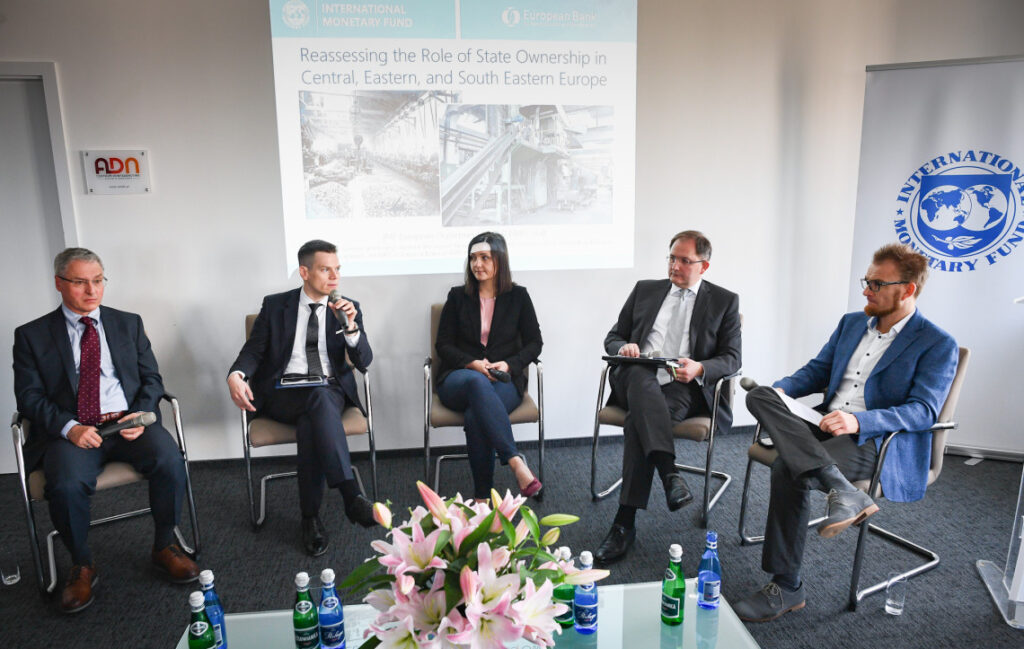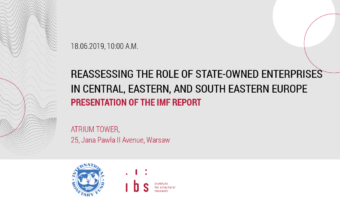he seminar jointly organised by IBS and International Monetary Fund (IMF) was dedicated to the presentation of a report examining performance of State Owned Enterprises (SOE) and Banks (SOB) in countries of Central, Eastern and South Eastern Europe (CESEE). The report, entitled “Reassessing the Role of State-Owned Enterprises in Central, Eastern, and South Eastern Europe”, was prepared by IMF in collaboration with European Bank for Reconstruction and Development (EBRD).
Nadeem Ilahi, Senior Resident Representative for CESEE, IMF, Warsaw opened the meeting and emphasised the importance of the topic of State Owned Enterprises in the region.
Presentation of the report

They showed that the scale of SOE in the CESEE region is still large, though there are significant difference between countries and sectors. They emphasised that SOEs’ performance is below that that of private enterprises. This manifests itself through lower revenue per employee, lower total factor productivity (TFP) and higher wages. Moreover, the authors showed that for a few countries (excluding Poland) worse performance is due to misallocation of labour. They highlighted that closing the gap in SOEs performance in comparison to private enterprises would raise overall productivity.
An important element of the report is a separate focus on banks which are at least partially owned by state. The authors showed that most SOBs perform worse than privately owned banks which demonstrates itself as higher rate of non-performing loans in bank’s portfolio. It is not the case in Poland where SOBs perform better than privately owned banks.
The last part of the presentation was dedicated to SOEs and SOBs governance. Based on the data collected by IMF and EBRD from the countries of the regions, the authors argued that the governance procedures in SOEs and SOBs are not in line with the best international practices. Estonia was presented as an exception.
The closing remarks included the authors’ key recommendations. The importance of re-examining of the topic was stressed, as well as the rationale behind SOEs and their governance. The authors pointed out the need to improve performance for SOEs and SOBs, even if privatisation was not one of the goals.
Panel Discussion

The presentation was followed by a panel discussion on the issues raised in the report, with insights on the experience in Poland. Piotr Lewandowski (President of the board, IBS) led the discussion and the panel participants included: Jacek Jastrzębski (Chair of the Board of the Polish Financial Supervision Authority, KNF), Grzegorz Zieliński (Regional Director, Head of Central Europe and the Baltic States, EBRD), Jan Rutkowski (Director of Policy Research at IBS) and Monika Tarsalewska (Senior Lecturer, University of Exeter and Warsaw School of Economics).
Grzegorz Zieliński presented conclusions from large privatisations in countries of the region in recent years. He pointed out that in many cases, the strengthening of national capital markets was a key reason for privatisation.
Jacek Jastrzębski highlighted that SOBs in Poland played an important role during the Great Recession by supplying credit to private enterprises, as the supply in the sector generally decreased. He pointed out that SOBs could provide liquidity needed for international expansion. When asked about the conflict of interest for state as the regulator and an owner of some banks, Jastrzębski pointed out to the transparency of the oversight.
Monika Tarsalewska stressed that the key challenge is to create a structure for SOEs and SOBs governance which would encourage the management to increase performance while keeping up with social and strategic goals. She mentioned an example of so-called impact funds which combine private capital with cooperating with SOEs in order to deliver socially useful projects.
Jan Rutkowski argued that high employment and wages in SOEs need to be looked at as an issue of political economy, as well as the main challenge in case of reforms in SOEs. The discussants did not agree, however, when is the best time to perform reforms of SOEs, whether it is the good economic times or recession. Some pointed out that a recession forces the need for reform, but others argued that during good economic times, the negative effects are perceived as less painful.
 Agenda-imf-NI
Agenda-imf-NI


